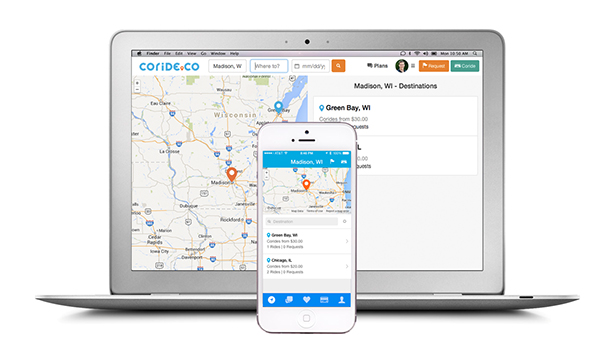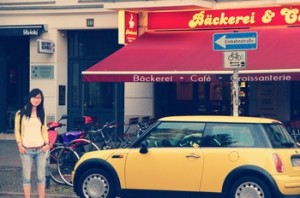Story by David Tenenbaum, University Communications
Coride is debuting a ridesharing service accessible from smartphones and computers. The company is getting ready to launch its mobile apps for iOS and Android. (Image courtesy Coride)
A young business started by a University of Wisconsin-Madison graduate student, which links drivers with empty seats to people needing a ride between cities, is ready to launch a mobile app.
“Coride’s” roots trace back to an observation Fei Ma (M.S.’11, Geography) made after returning from a visit to Germany in 2012. “I was using this German ride-sharing service, and had a great experience riding with strangers, but when I got back to Madison, I thought, ‘Hey, all these seats are empty.’ I searched all the ride-share sites. They had really awful websites, and so I had this idea.”
On a trip to Germany, Fei Ma wondered if she should hitchhike or not. Then, she found a ride through a German website and the idea for Coride was born. (Submitted photo)
The idea lingered for a year as Ma, a native of China, worked on her Ph.D. in theUW-Madison geography department. Then, last summer, while attending the university’s Entrepreneur Boot Camp, “I thought, I’m going to put this idea into action; I will solve this problem and make intercity travel easier for everybody,” says Ma.
Ma is the founder of the new business Coride LLC, which is debuting a ride-sharing service accessible from smartphones and computers. Using a mobile app, “you can pull out your phone and chat with a passenger or a driver so you know what they are like, what they prefer,” says Ma. “This makes it much easier and safer to use than ride boards, or Facebook and Craigslist.”
Coride has about 10 employees and interns, and is getting ready to launch its mobile apps for iOS and Android.
To begin the process, riders and drivers register with Coride and create their own profiles. Right from the beginning, the process is focused on safety and security, Ma says. “When you offer or get a ride from someone, you will find information about their social networks, LinkedIn, Facebook, and reviews from others who have ridden with them. You will type in your credit card information to pay or receive payment, but your privacy will be protected. It’s way better than Craigslist, or asking for a ride to Chicago on a bulletin board or Facebook groups.”
“I have two parallel passions,” says Ma, who is studying the formation of sand dunes. “I’m really interested in deciphering patterns in nature, and I’m concerned about climate change and passionate about solving environmental issues. Coride is a way to leverage individual efforts to mitigate climate change.”
On average, 80 percent of the seats in American cars on the highway are empty, Ma says.
Much of the marketing effort will focus on college students, who “have a higher demand for this, and are more open to the sharing economy,” says Taylor Lee-Clarahan, an intern at Coride who is majoring in marketing and finance at UW-Madison.
The service will appear on more than 40 university-focused Facebook ride-sharing sites where, Ma says, users “are familiar with the idea, know the pain of finding a ride through sites that require you to scroll down to figure out when they are leaving and where they are going.”
Ma insists that Coride is fundamentally different from the digital services Uber and Lyft, which the city of Madison is treating as unregulated taxis. “This is a marketplace to trade empty seats; it’s not a bus or a taxi, which provide service on demand or on schedule.”
Both supply and demand favor the new service, Ma says. “Many people need a ride, and there are so many empty seats in cars. If we succeed, carbon emissions will be cut, and riders will have it easier. People are always wondering, ‘How can I meet people?’ Maybe they can meet when they ride together.”
Coride has won two recent awards at the UW: third place in the G. Steven Burrill Business Plan Competition, and a $5,000 AARP Foundation Prize.
In response to the obvious question, Ma says, “Sure, I’ll use it myself. When I tried to explore this region, I was frustrated at not being able to find anything to help me get around in a safe, secure way. You are making other people’s lives easier, but you feel better because your life is made better by your product too.”

